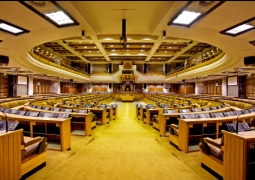
Parliament, Tuesday 26 November 2019 – The National Assembly Rules Committee, which National Assembly Speaker Ms Thandi Modise chairs, has agreed to draft rules for removing office bearers and commissioners in Institutions Supporting Constitutional Democracy (ISDs) and will now report on these to the National Assembly for a decision.
The institutions are the Auditor General; the Commission for Gender Equality; the Commission for the Promotion and Protection of the Rights of Cultural, Religious and Linguistic Communities; the Electoral Commission; the Public Protector; and the South African Human Rights Commission.
Existing Rules of the National Assembly and section 194 of the Constitution set broad parameters for removing office bearers or commissioners in these institutions. For example, section 194 of the Constitution provides for removal only on:
- the ground of misconduct, incapacity or incompetence;
- a finding to that effect by a committee of the National Assembly;
- the adoption by the Assembly of a resolution calling for the person’s removal from office.
The new, draft Rules elaborate on what would constitute the grounds of misconduct, incapacity or incompetence:
- “misconduct” means the intentional or gross negligent failure to meet the standard of behaviour or conduct expected of a holder of a public office;
- “incapacity” includes a permanent or temporary condition that impairs a holder of public office’s ability to perform his or her work and any legal impediment to employment;
- “incompetence” in relation to a holder of public office, includes demonstrated and sustained lack of knowledge to carry out and ability to perform or skill to perform his or her duties effectively and efficiently.
The new draft Rules also provide for any member of the National Assembly to initiate, through a substantive motion, proceedings for a section 194 inquiry. The National Assembly Speaker must refer the motion and any supporting documents for preliminary assessment to an independent panel. The Speaker must also, without delay, inform the Assembly and the President of this referral.
The three-member panel, of fit and proper South African citizens, must collectively have the necessary legal and other competencies and experience to conduct the assessment. A judge may be appointed to the panel but the Speaker must make such an appointment in consultation with the Chief Justice.
Political parties represented in the National Assembly must also have had a reasonable opportunity to put forward proposed nominees to serve on the panel
Within 30 days of its appointment, the panel must conduct and finalise a preliminary assessment on the motion proposing a section 194 inquiry and make a recommendation to the Speaker.
The Speaker must then schedule the panel’s recommendation for decision by the National Assembly. If the Assembly resolves the inquiry should go ahead, the matter must be referred to a special section 194 committee for formal inquiry.
That committee, with powers applicable to other parliamentary committees, must conduct the inquiry, establish the veracity of the charges and report back to the National Assembly.
The committee’s report, which must contain findings and recommendations and reasons for these, must be scheduled for consideration and debate with due urgency, given the programme of the Assembly.
If the report recommends that the holder of a public office be removed from office, the question must be put to the Assembly directly for a vote in terms of the rules and if the required majority of Assembly members support the question, the Assembly must convey the decision to the President.
ISSUED BY THE PARLIAMENT OF THE REPUBLIC OF SOUTH AFRICA
Enquiries: Moloto Mothapo 082 370 6930

